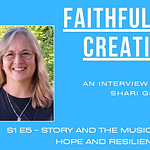You can listen to the version audio or read the full reflection (transcript) below:
The fact that we hold this collection of books as sacred (or if you personally don’t, you may at least agree that there is deep ancient wisdom there), is enough to say that we may want to do our best to understand what the Bible is all about.

Interpreting the Bible can be challenging but, believe it or not, it can also be fun, and diving into understanding the bible through imaginative engagement with the stories, letters, poems and more that lie within its pages can be deeply rewarding, even life-changing.
On Saturday, Nov 18th, 2023 from 9:30 to 11:30, I will be offering a workshop on Interpreting the Bible Imaginatively. (In person only at 590 University Cres, Winnipeg) Email me if you plan to come!
The idea for this started when last year someone asked me about where ideas for some of my sermons come from. They were basically commenting on how they seemed to “get more out of it” when listening to a sermon about a particular text than when they would read the same text on their own.
This isn’t really that surprising. It is almost always better to be in a community setting when trying to understand the Bible (or any text). Also, I spend many hours on a given sermon, I went to seminary, and I have over twenty years of preaching experience.
At the same time, I really believe that there are things anyone can learn to help them in their understanding of the Bible, and one of the greatest things we can learn is how to read Scriptures while engaging our imaginations.
What do I mean by that?
Part of it is giving yourself permission. Permission to play with the text, to wonder, to ask questions, to focus in on specific images or words, and to focus out on the wider story arc, seeking connections with other parts of the Bible.
This is what we will learn and practice together at our little 2 hour workshop on Nov 18th, but for now, here’s a bit of a reflection on some of the challenges of this approach…
It can sometimes be hard to interpret scripture by using our imagination because we can feel hemmed in by a number of things. We may feel restricted by tradition, by particular teaching that is ingrained in us. We may feel constrained by certain concepts of God. We may have been taught that God absolutely must be this way or that way. We may feel trapped by particular philosophies, world-views, or pedagogies. For example, we may subtly believe that authority is never to be questioned, or we may believe the opposite: that no authority is to be trusted. We may somehow feel limited by the Bible itself. Shouldn’t we look at more than just scripture?
Or we may feel paralyzed by a lack of biblical knowledge and so we hesitate to jump in. For some of us, we have been taught not to trust ourselves, or that our thoughts or ideas do not have value, or are probably wrong. Or we don’t want to risk sharing something that we imagine coming from a biblical text for fear that we will sound stupid, or that others with more theological knowledge might shut us down or shame us. Maybe we’ve been shut down before.
Another reason it can be hard to interpret scripture imaginatively is because we have a sense that the Bible is sacred, and so to wrestle with it, question it, read against it at times, or play with it, might seem somehow irreligious or just plain wrong.
But, perhaps the most difficult barrier to interpreting scripture imaginatively is that many of us have all but lost our ability to imagine at all. We are more used to formulas, processes, techniques, and the application of critical methods. Of course, we can learn those tools as well and they can be of great help, but imagination is another matter, and is actually, for the average reader of the Bible, more readily available, and dare I say, more fun to employ.
When confronted with a story from the bible it might be very useful to ask “what is the historical context of this story?” We may even have a good study bible or commentary that can help us answer that. But we might not be as used to thinking to ourselves things like: “I’m going to pretend that I’m a shepherd and think about how I would feel or what I would do if an angel suddenly showed up in my field.”
This may not be the best example, but you get what I mean, I think. My point is that for some of us, somehow our imagination engaging with the text seems less legitimate than historical-critical knowledge. We have held some ways of knowing as the ONLY ways, and have often devalued and severely underused our imagination, to the point that we are hopelessly out of practice.
The imagination is relegated often to the realm of children alone, and many adults have forgotten how to use it. This is to our detriment, because without imagination, our engagement with such a diverse and complex set of books ranging in literary forms from poetry to letters, to narrative, to law codes, to parables, will always languish. Not only will we understand less about what the Bible is saying, but this most sacred text will feel further and further from us.
Engaging imaginatively with the Bible (and perhaps with anything) jumpstarts relevance and application. What I mean is that when you apply your imagination to a particular Biblical text, you are becoming invested. You are opening yourself up to what it might be saying to you.
So, perhaps you’ll join me, if you can on Nov 18th in the morning for a could have hours. We will actually look at some biblical texts and learn together about how to engage imaginatively with them. It would be helpful to me to know how many people to expect (for the purposes of snacks!), so please email me to let me know you’re coming.












Share this post